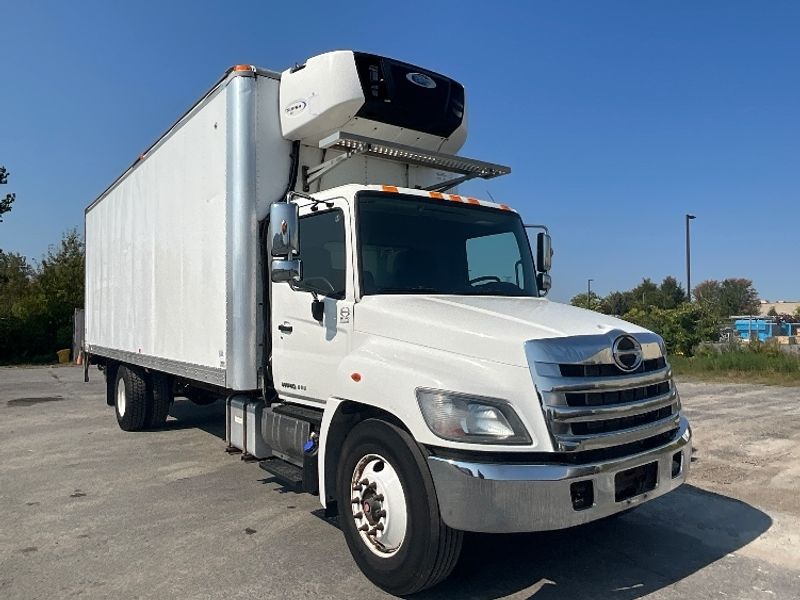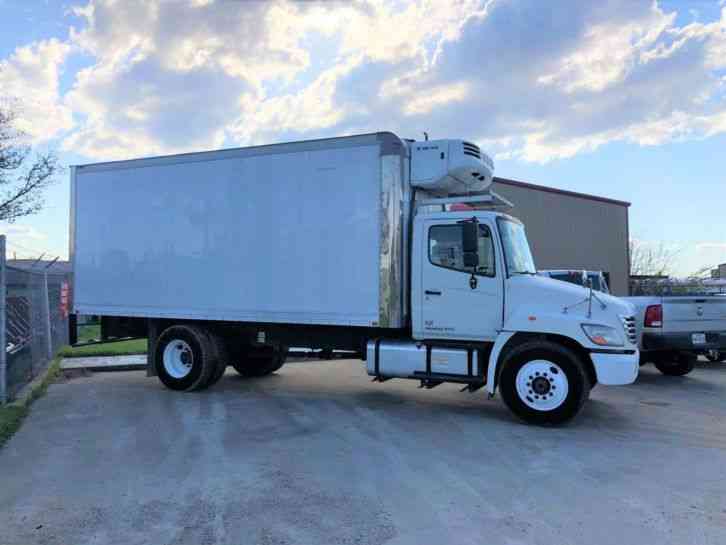Reefer Trucks Thermo King: Leading the Way in Cold Chain Modern Technology
Reefer Trucks Thermo King: Leading the Way in Cold Chain Modern Technology
Blog Article
Picking the Right Transportation Refrigeration System for Your Fleet
Picking a proper transportation refrigeration system for your fleet is a vital decision that can considerably impact operational efficiency and item honesty. It requires a comprehensive understanding of your particular refrigeration requirements, consisting of temperature level requirements and distribution timetables.
Comprehending Your Refrigeration Needs
When picking a transport refrigeration system, comprehending your certain refrigeration needs is extremely important to guaranteeing item quality and conformity with industry standards. Various variables need to be thought about to identify the most suitable system for your operation. These consist of the sort of products being moved, their temperature needs, and the duration of transportation.
For subject to spoiling products, such as fresh fruit and vegetables or drugs, accurate temperature control is crucial. Comprehending the temperature level range needed for every product enables the choice of a system that can maintain those problems constantly. Additionally, think about the regularity of distributions and the range took a trip; longer journeys may require systems with boosted insulation or back-up power options to stop temperature level changes.

Moreover, the ability of the refrigeration device ought to line up with your lots size. By thoroughly assessing these elements, you can make sure that your selected transportation refrigeration system properly satisfies your operational needs and maintains product stability.
Sorts Of Transportation Refrigeration Equipment
Picking the best sort of transport refrigeration system is essential for making certain the secure transit of temperature-sensitive items. There are a number of systems readily available, each developed to fulfill particular needs and applications.
One of the most typical types include direct expansion (DX) systems, which utilize refrigerant to soak up warm and cool down the freight area properly. These systems are usually favored for their performance and lower first prices. Another option is the main refrigeration system, which serves several areas or automobiles from a solitary compressor system. This is specifically beneficial for larger fleets requiring constant temperature level control throughout various transport units.
Furthermore, there are self-supporting refrigeration systems that integrate the compressor and evaporator in one plan. When space is limited, these systems are ideal for smaller vehicles or. For specialized applications, such as transporting perishables or drugs, cryogenic refrigeration systems might be used, utilizing liquid nitrogen or carbon dioxide to preserve ultra-low temperatures.
Lastly, hybrid refrigeration systems that combine electrical and diesel power are becoming increasingly preferred, providing adaptability in power use and lowering environmental impact. Recognizing these numerous types enables fleet drivers to make enlightened choices customized to their certain functional requirements.
Secret Functions to Consider
Just how can one make certain that a transportation refrigeration system fulfills all operational requirements? To achieve this, several vital functions have to be thoroughly evaluated. First of all, temperature level control is important; systems ought to provide exact temperature settings to fit different items, ranging from iced up items to subject to spoiling products.
Energy performance is an additional essential consideration, as it influences functional costs. Seek systems that utilize advanced modern technology, such as variable speed compressors, to optimize energy usage without endangering efficiency.
One more feature to evaluate is the dependability and resilience of the equipment. Solutions built from top quality products and developed for resilience against rough conditions will certainly decrease upkeep expenses and downtime.
Furthermore, the ease of upkeep and accessibility of components can substantially affect functional effectiveness (reefer trucks thermo king). Attributes like modular styles or remote monitoring capabilities can enhance solution processes
Finally, compatibility with existing fleet management software program can enhance monitoring and reporting procedures. By concentrating on these key features, fleet drivers can make sure that their transportation refrigeration systems not just meet existing needs yet additionally adjust to future requirements.

Budgeting for Refrigeration Solutions
Evaluating vital features of transportation refrigeration systems is just one part of guaranteeing functional efficiency; budgeting for refrigeration remedies is equally crucial. A well-structured spending plan not only encompasses the initial purchase price but likewise considers long-term operational costs, consisting of power consumption, maintenance, and potential fixing needs.
When establishing a budget plan, fleet managers must first assess the total expense of possession (TCO) This consists of not just the purchase costs but additionally continuous expenditures related to fuel efficiency and the durability of the refrigeration devices. Selecting systems with higher energy efficiency rankings might produce considerable financial savings over time, reducing upfront costs.
Moreover, fleet operators must represent potential scalability. As companies grow, the refrigeration requires may transform, demanding upgrades or additional systems. Planning for these future costs can stop financial pressure.
Funding choices can also play a crucial duty in budgeting. Leasing, fundings, or outright purchases each have distinctive monetary implications, and recognizing these can aid in making an informed choice. Ultimately, a thorough budget that takes into consideration both prompt and future demands guarantees that transportation refrigeration systems contribute positively to the general functional performance of the fleet.
Upkeep and Support Choices
In the realm of transport refrigeration systems, effective upkeep and support options are important for guaranteeing ideal performance and longevity. Regular upkeep is necessary to prevent breakdowns and maintain the integrity of temperature-sensitive cargo. It is suggested to develop a regular assessment routine with qualified service technicians who can do essential checks and repair work on refrigeration devices.
Assistance choices must include a durable service contract, covering both routine maintenance and emergency repair services. This makes sure that find more your fleet has accessibility to motivate help, decreasing downtime and keeping operational effectiveness. Numerous manufacturers use detailed assistance packages that include training for your staff, allowing them to do standard troubleshooting and upkeep tasks.
Furthermore, utilizing remote surveillance innovation can enhance your upkeep strategy - refrigerated transportation thermo king. These systems supply real-time information on temperature and performance, enabling positive other steps before issues escalate. Investing in training and innovation not just boosts your fleet's dependability but likewise prolongs the life-span of your refrigeration systems
Ultimately, a critical strategy to maintenance and support will certainly secure your investment and make certain that your transport refrigeration systems run at peak effectiveness, supplying consistent outcomes for your business.

Conclusion
To conclude, picking the proper transportation refrigeration system for a fleet requires an extensive assessment of specific refrigeration requirements, system types, and vital functions. Prioritizing operational effectiveness, energy consumption, and maintenance considerations is critical for making certain dependability. Furthermore, cautious budgeting and preparation for future scalability will add to the lasting success of the refrigeration approach. Eventually, a knowledgeable decision will certainly enhance product stability and optimize general logistics procedures within the fleet.
Choosing an ideal transportation refrigeration system for your fleet is a crucial decision that can substantially impact operational efficiency and product integrity.When picking a transport refrigeration system, recognizing your particular refrigeration needs is vital to making certain item quality and conformity with sector criteria. By thoroughly evaluating these elements, go to website you can make sure that your selected transportation refrigeration system effectively meets your operational requirements and maintains item stability.
Eventually, an extensive spending plan that takes into consideration both immediate and future needs guarantees that transportation refrigeration systems add positively to the overall operational performance of the fleet.
In conclusion, picking the appropriate transportation refrigeration system for a fleet demands a comprehensive analysis of particular refrigeration demands, system types, and vital attributes.
Report this page